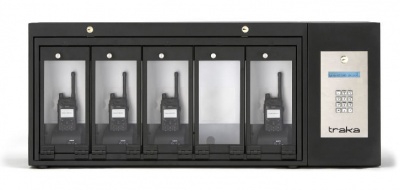Traka serving Thames Valley and Northamptonshire Police
As well as the electronic lockers containing replacements for standard airwave radios and accessories, the force has recently introduced a new range of lockers for securing radios used on selected special operations by a small number of highly trained off
Just as Police Forces across the country take pride in serving their communities, so too Traka takes pride in serving the Police with asset management solutions that can control keys and access to everything from police vehicles to lockers; used for managing access to equipment such as radio terminals, gas, breathalyzers, dragon lights and even firearms.
Here we look at how these intelligent systems help ensure better security and management control for Thames Valley and Northamptonshire Police, just two of the many UK Forces already using Traka solutions.
Secure police radio communications using the Airwaves Network is an accepted and everyday part of modern policing, with each officer having their standard issue radio - but what happens when one goes wrong or gets damaged? “With over 5,000 airwave radios in use across the Thames Valley Force, we need to be able to make replacements available day or night, and quickly,” says Martin Trott (Airwaves Team Leader, Thames Valley Police). He goes on to explain how this is managed effectively and at low cost. “Obviously we don’t want an officer driving from Banbury to Oxford just to get a replacement; but equally these are important assets and we can’t have spares just lying around everywhere with the potential of getting lost or falling into the wrong hands.”
Replacements are held in 29 locations across the region. Officers needing a spare or replacement radio access the electronically operated locker system by making a telephone call to a 24/7 helpdesk using a dedicated adjacent telephone. The helpdesk operator then checks the identity of the officer and remotely unlocks the electronic locker to allow access to a replacement unit and enters details into the bespoke Traka32 database.
The radio lockers also need to be accessed by technical engineers for the collection of faulty radios, at which time a physical check is made to ensure that all units are accounted for. This access is managed locally with the engineer having a PIN code, gaining access to the appropriate locker. The helpdesk central release system works well, comments Martin, “It operates quickly, is readily available 24/7, and we can be confident that an officer’s identity has been correctly established.”
As well as the electronic lockers containing replacements for standard airwave radios and accessories, the force has recently introduced a new range of lockers for securing radios used on selected special operations by a small number of highly trained officers. For these special operations radios, Traka’s RFID tagging is incorporated to uniquely identify each radio, recording when a terminal is removed from one of the cabinets and by whom. Significantly, the central administration software clearly identifies and visually displays on screen the movement of radios in and out of these Traka cabinets.
“Our upgrade with Traka was very smooth,” says Martin Trott. “It’s a very flexible system and definitely serves our requirements well.
Traka is used extensively in the UK and over 25 countries worldwide.
Source: TRAKA

